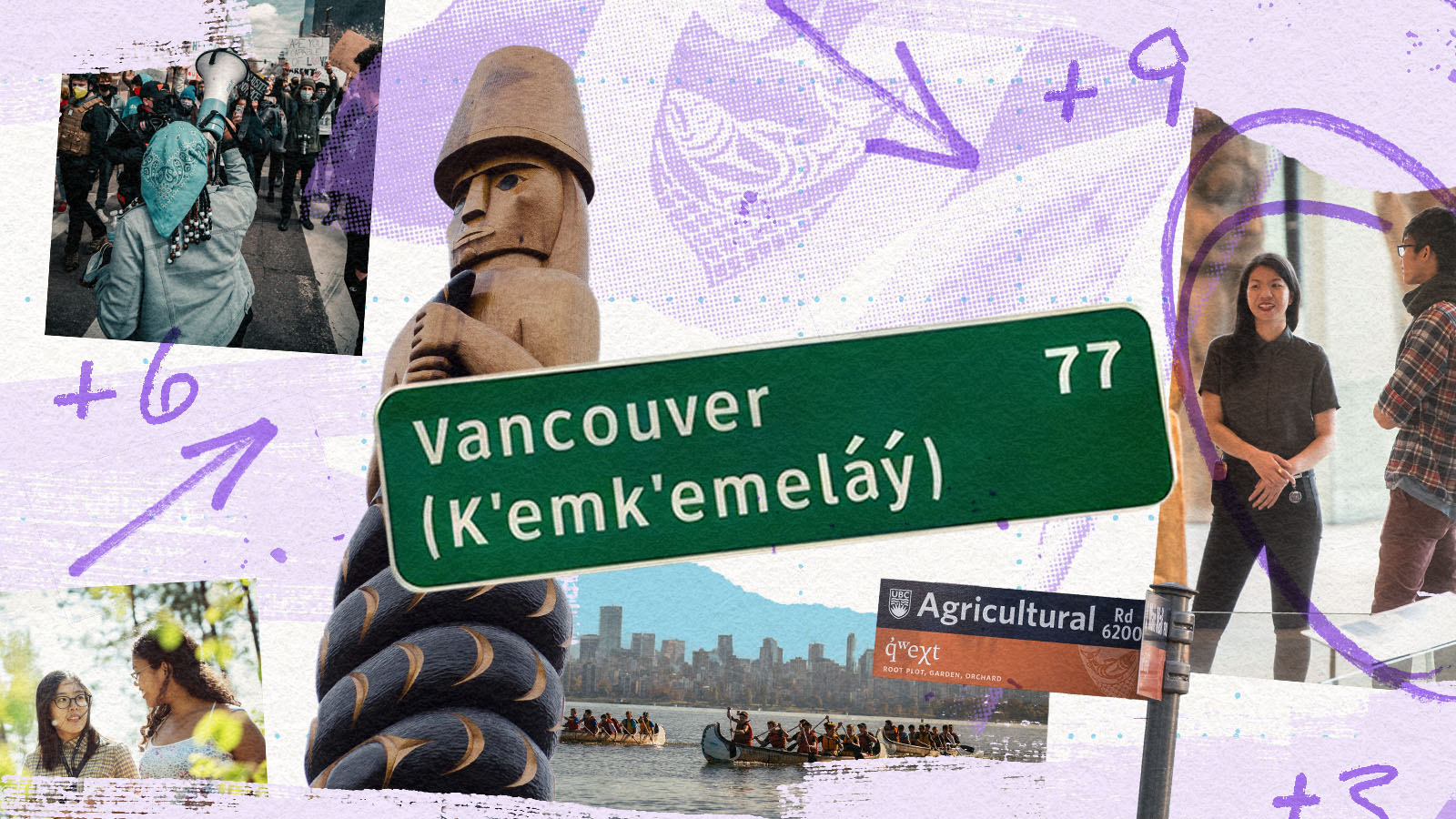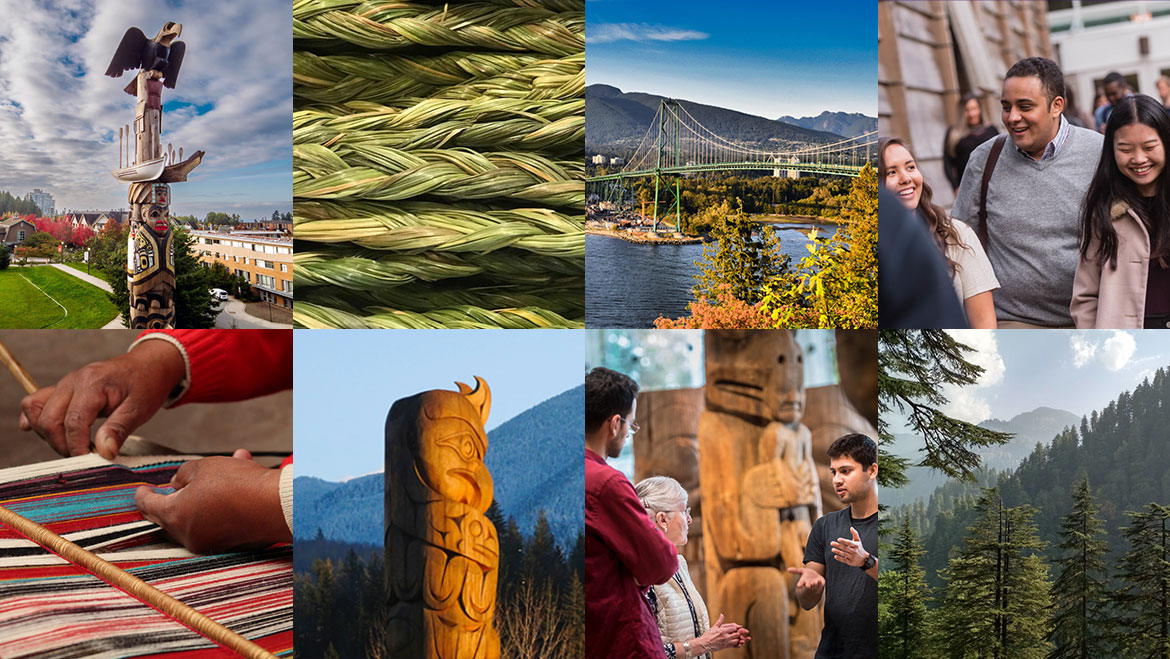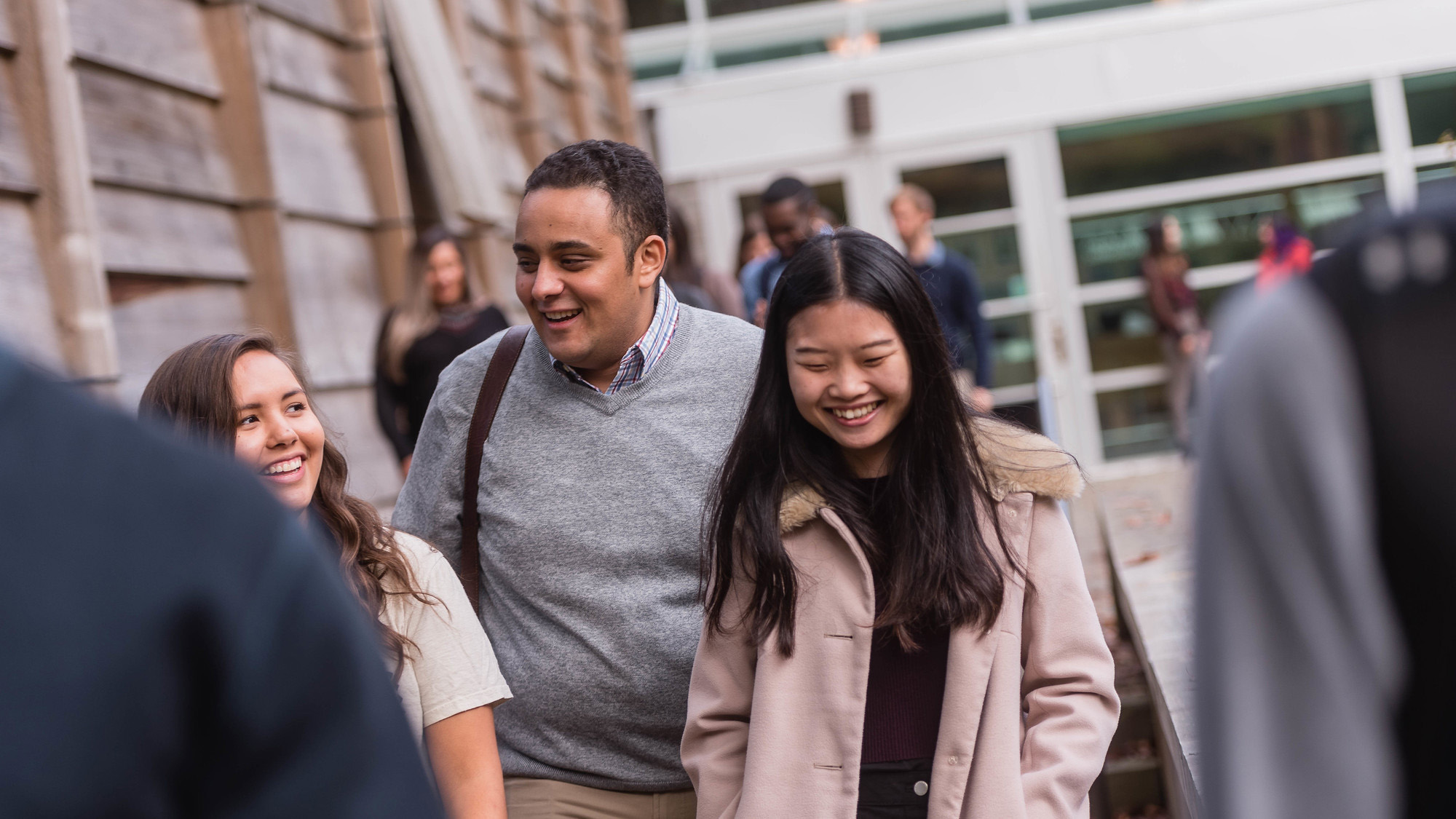

Place and Power is a Bachelor of Arts degree requirement at UBC Vancouver that challenges students and instructors to critically engage with the lands, histories, and power structures that shape where we live, work, and learn, particularly here on the traditional, ancestral, and unceded territory of the Musqueam people.
Learn about its purpose, how faculty can propose a course, and explore currently approved courses.
Students: Looking for Place and Power courses? Head to the degree planning page to explore courses and get started.
What is Place & Power?
Purpose, scope, and ethos
The Place and Power BA degree requirement reflects the Faculty of Arts’ deep commitment to ethical and meaningful engagement with Indigenous lands, histories, and communities that shape our university and the province that we serve. This requirement embodies how the Faculty can intentionally respond to our location in relation to Indigenous presence, sovereignty, and resurgence across what is now British Columbia – most notably, our specific location on the traditional, ancestral, and unceded territory of the xwməθkwəy̓əm (Musqueam people).
The Place and Power initiative invites departments, instructors, and students to grapple with how research and scholarship, disciplinary methodologies, and pedagogies intersect with Indigenous dispossession, contestations over place, Indigenous knowledges and scholarship, and the diverse lived experiences of those who call these lands home.
All incoming Bachelor of Arts students are required to complete at least three credits of Place and Power (P&P) designated courses as part of their degree. These courses are offered by departments and programs across the Faculty, and reflect a wide range of disciplinary perspectives and teaching approaches. This diversity is intentional, underscoring the value of multiple ways of knowing and engaging with the themes of Place and Power. Departments and instructors bring their own lenses, scholarly expertise, and pedagogical approaches into their classrooms. As a result, P&P courses offer a diverse set of learning opportunities for students, while also sharing a core set of principles and parameters.
All courses in the Faculty of Arts are expected to promote thoughtful dialogue, honest reflection, and deep, critical engagement. For P&P courses, this ethos is essential to fostering a healthy classroom climate. These courses often engage with complex historical and contemporary issues that may prompt challenging and sometimes difficult or uncomfortable conversations inside the classroom and beyond. Through a rigorous and collaborative course review process as well as ongoing instructor support, the Place and Power initiative encourages instructors to prioritize and intentionally cultivate a responsive classroom climate in their course design, instructional approaches, and preparation.
Why “Place” and “Power” matters
Place and Power courses ask students to situate themselves inside the story of the complex histories that shape political, social, and economic realities of the place where they study. All Place and Power courses situate learning in relation to the unceded Indigenous territories on which UBC is founded, while critically examining the inequities embedded within landscapes of the colonial present.
Recognizing that all places are formed through histories of encounter, contestation, and negotiation, Place and Power courses ask what it means to work, learn, and live with the colonial legacies that have and continue to shape BC. Drawing on the rich expertise available in the Faculty of Arts, these courses convey the breadth of our shared responsibilities as scholars who consciously learn from and study on unceded territories.
From a range of disciplinary and theoretical vantage points, all P&P courses anchor inquiry to the lands now called British Columbia. For instance, some P&P courses specifically focus on Musqueam territory and sovereignty along with the histories and processes that have formed UBC over the years. Others examine our presence on unceded Indigenous lands across what we now know as Metro Vancouver, its surrounding communities, and the Province of British Columbia. Other courses ask how studying on unceded Indigenous territories reconfigures the way we approach topics and methodologies that extend beyond BC.
Place and Power courses
The Faculty of Arts invites instructors from all academic disciplines to propose new or existing courses for inclusion in the approved Place and Power list. The proposal process is designed to be collegial, welcoming instructors into a broader conversation and community at UBC.
What makes a P&P course?
P&P courses explore how local and transnational power relations shape places within what we now call British Columbia. To be designated as Place and Power courses must meet six inclusion criteria that reflect the initiative’s values, ethos, and learning objectives.
These criteria were developed in consultation with key stakeholders and guide the course review process.
- Centering of Indigenous Lands and/or People: Positions Musqueam and/or other relevant Indigenous communities and lands in what is now BC as central to teaching and learning (e.g. considers the disciplinary implications of studying at a university situated on unceded land).
- Place and Land relationships: Frames notions of place and/or the local in relation to contested land and/or land relationships.
- Power analyses: Examines power imbalances faced by Indigenous and/or other historically, persistently, and systemically marginalized (HPSM) communities in BC.
- Strength-Based Frameworks: Uses approaches like survivance, revitalization, sovereignties, and innovation to ground discussions of how Indigenous and HPSM communities navigate power structures.
- Indigenous Expertise & Knowledge: Foregrounds Indigenous scholarship and perspectives relevant to the course topic (e.g. a geography course includes Indigenous knowledge producers whose research addresses relevant land relations).
- Classroom Climate: Ensures attentiveness to power relations in the learning space, particularly as these affect Indigenous and historically marginalized students.
The way in which courses reflect and engage with these criteria can vary significantly depending on the year level, discipline, and course topic. This flexibility is intentional—the criteria are meant to serve as a foundation for exploring how your classroom and course unpack structures and processes of power that operate both locally and transnationally within what now is called British Columbia.
Explore approved courses
Place and Power courses are offered across Arts disciplines, each approaching the themes of place, power and Indigenous sovereignty through distinct lenses.
Course proposal process
The first step of the Place and Power course review process is to submit an Expression of Interest that briefly describes the course, how it aligns with P&P objectives and criteria, and the research and teaching experience of the proposed instructor(s). This step initiates an informal, collegial dialogue between the proponent and the Coordinating Committee, allowing idea exchange and early feedback before the full proposal stage.
- Course Overview and Summary: A high-level synopsis of your course
- Alignment with Place and Power: Responses to three questions on how the course meets P&P objectives
- Positionality and Pedagogical Statement: A reflection on teaching approach and perspectives
We encourage department heads, program chairs, and curriculum coordinators to be informed or involved in submissions from their unit(s) to ensure good coordination with all involved.
Upon the approval of your Expression of Interest, proponents will be invited to submit a full proposal for P&P course designation.
Full proposals must include:
- Updated Expression of Interest: With any relevant new information to help contextualize the review of your annotated syllabus and resource list.
- Annotated Syllabus: Clearly indicating how each of the six P&P inclusion criteria are met. Use footnotes or comment bubbles to tag specific parts of the syllabus with brief explanations.
- Comprehensive Resource/Reading List: Highlighting the integration of Indigenous scholarship, knowledge, and expertise.
Note: If you are proposing a new course, you must complete the Senate and ACC process before or alongside the full proposal stage. If you have questions related to ACC and P&P, please contact us.
Each full proposal will be reviewed by a trio of Coordinating Committee members for alignment with the inclusion criteria. At this stage, reviewers may suggest revisions for course development or initiate a conversation to seek clarity on questions that arose during review.
The focus of this stage is constructive and collegial feedback that supports course development and professional growth. Approved courses will be forwarded to the Dean’s Office and Arts Curriculum Committee for final inclusion in the P&P requirement.
To keep the Place and Power course list up to date, all designations will expire after four years. Instructors or departments wishing to maintain their designation will need to complete a re-designation process. The exact steps are still in development, but will likely require submitting an updated annotated syllabus.
The Place & Power Coordinating Committee (CorCom) guides the overall strategy and implementation of the Place & Power (P&P) requirement. The CorCom is a stand-alone entity that communicates and works closely with the Dean’s office, but is not supervised by them.
Through the Co-chairs, the CorCom will communicate with the Dean’s office, Heads and Directors, and the Arts Indigenous Advisory Council on a regular basis.
Co-chairs
- Juanita Sundberg (GEOG)
- Chris Lee (ENGL)
Core members
- Ayaka Yoshimizu (AISA)
- Camille Georgeson-Usher (AHVA)
- Coll Thrush (HIST)
- Dylan Robinson (MUSC)
- Henry Yu (HIST)
- Janelle Kaperski (CTLT)
- Janey Lew (CTLT)
- Karlene Harvey (AISA)
- Laura Ishiguro (HIST)
- Leslie Robertson (ANTH)
- Miranda Burgess (ENGL)
- Nathan Lauster (SOCI)
- PJ Rayner (Dean’s Office)
- Renisa Mawani (SOCI)
- Tim Frandy (CENES)
- Dennis Britton (ENGL) - served from 2023 to 2025
Key due dates for 2025/26:
- Expression of Interest: Wednesday, October 15, 2025
- Full proposals: Monday, February 9, 2026
If you have any questions about Place and Power or would like to meet with us to chat through how your course may or may not fit, email us at PlacePower.BA@ubc.ca.


